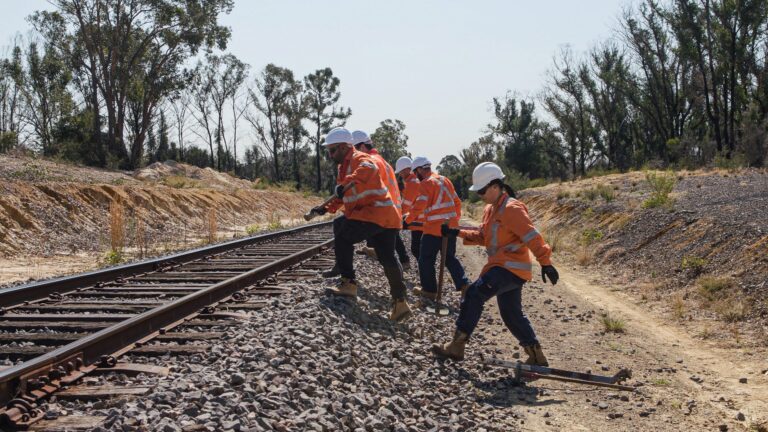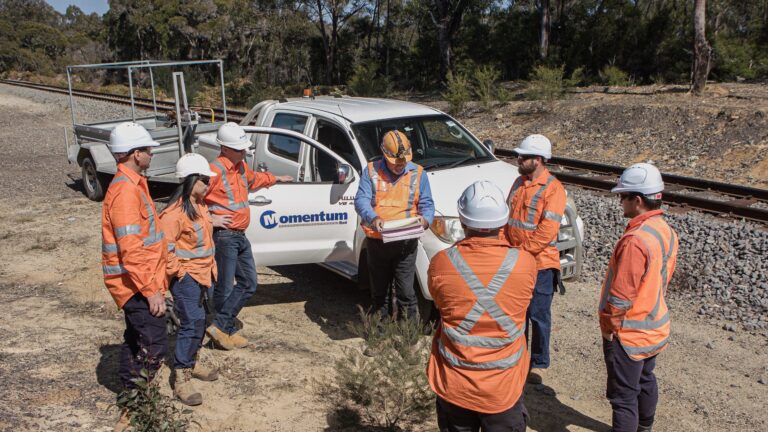A Guide to Safely Access the Rail Corridor NSW Course (2024 Update)
Safely Access the Rail Corridor (SARC) in NSW course, formerly known as the Rail Industry Safety Induction (RISI) is a comprehensive training program designed to equip individuals with the essential knowledge and skills required to work safely in and around the rail corridor within the Transport for NSW network.
Whether you are a newcomer seeking to understand the prerequisites for participation or a seasoned professional aiming to refresh your understanding, these FAQs will provide insights into the prerequisite requirements for obtaining a Rail Industry Worker (RIW) card, and other pertinent details.
FAQs about Safely Access the Rail Corridor in NSW:
Let’s delve into the key aspects of this crucial training, ensuring a thorough understanding of the Safely Access the Rail Corridor course in New South Wales.
What is Safely Access the Rail Corridor?
Safely Access the Rail Corridor is a recognised NSW course designed to equip participants with the training, skills, and knowledge required for secure operations in the rail environment.
The training will detail how to take appropriate safety precautions when entering the danger zone and navigating the rail environment and how to respond appropriately in an emergency. This course is for people who are going to be working in and around the rail corridor.
CERT Training Accessing the Rail Corridor course is a mandatory requirement for anyone performing work in the Transport for NSW rail corridor (including between Sydney, Nowra, Lithgow and Broadmeadow) and is recognised by Australian Rail Track Corporation (ARTC) and UGL Regional Links (UGLRL).
During the training, participants will learn to identify potential risks and key hazards of the rail environment, such as electrical safety hazards.
The curriculum will also cover critical safety requirements and legal obligations, including the mastery of hand signals and communication tools, effective work site protection management, and adherence to basic rules within the danger zone.
Read more about the RISI course for NSW jobs here.
What are entry requirements for Safely Access the Rail Corridor in NSW course?
Participants enrolling in the Safely Access the Rail Corridor in NSW course will undergo a Language, Literacy, and Numeracy (LL&N) assessment at the course commencement. This assessment is crucial to ensure that participants possess the necessary skills to:
- Read and comprehend work safety signs and symbols.
- Understand workplace policies and procedures.
- Effectively communicate identified hazards.
If you are undertaking CERT Training’s TLIF0020 TfNSW Accessing the Rail Corridor Induction (SX52/RISI), there are no specific course prerequisites required. However, there is an essential consideration regarding age.
Applicants under the age of 17 must obtain a Rail Safety Worker Authorisation from Transport for NSW before enrolling in the course.
This authorization is essential, and its eligibility must be confirmed in writing by TfNSW Organisational Development (OD) before the candidate can participate in the training.
Note: The process of obtaining Rail Safety Worker Authorisation may take up to 10 working days upon the receipt of the applicable form.
What are the materials and/or equipment required for SARC?
Participants are required to wear specific Personal Protective Equipment (PPE) during the TLIF0020 Safely Accessing the Rail Corridor course. This includes closed-in shoes that are suitable for wear within the rail corridor.
Additionally, learners will be provided with essential materials and equipment during the course, ensuring a comprehensive learning experience. These include workplace documents, a learner workbook, and references to Sydney Trains Network Standards, Rules, and Procedures.
How long will the course take?
The TLIF0020 Safely Accessing the Rail Corridor course is designed to be a one-day off-the-job training program. It is advisable for participants to plan for a full day of training to complete the course successfully.
What is the delivery method for SARC?
If you are undertaking this course with CERT Training, SARC is facilitated via a face to face workshop.
What are the assessment requirements to complete the TLIF0020 course?
To complete the TLIF0020 Safely Accessing the Rail Corridor course, participants are expected to demonstrate proficiency in both theoretical knowledge and practical application.
At CERT Training, the assessment requirements for TLIF0020 include a closed-book theory assessment conducted in class and a practical demonstration conducted one-on-one in a non-live track environment.
In the event of being assessed as “Not Yet Satisfactory” (NYC) on the first attempt, individuals are granted one opportunity to resubmit the assessment task, incorporating improvements based on assessor feedback.
Additional assessment attempts may be considered at the discretion of the Learning Delivery Manager or their delegate, contingent upon a review of the participant’s training and progress.
If an NYC result persists, targeted coaching and training will be provided to support improvement. Participants also retain the right to appeal an NYC result.
What certificates will I receive upon successful completion?
Upon successfully completing all assessments in the TLIF0020 Safely Access the Rail Corridor course, participants will receive a Statement of Attainment for TLIF0020.
Additionally, participants have the opportunity to further advance their expertise within the rail industry by enrolling in the TLI27121 – Certificate II in Rail Infrastructure qualification.
Do I need to take this course to get my RIW card?
Yes. The RIW Card is issued to rail workers possessing specific competencies, and these competencies vary depending on the rail network operator.
The SARC course is identified as a mandatory requirement for individuals seeking to obtain an RIW Card, especially for several rail network providers.
To ensure you meet the requirements, compliance and adequacy of training, individuals planning to obtain an RIW Card are advised to consult with their prospective employer about the specific training requirements applicable to the rail network they intend to work within.
What are the prerequisite requirements for a RIW card?
The prerequisite requirements for obtaining an RIW card based on the rail network may vary depending on the specific rail operator or authority.
For Transport for NSW, rail industry workers need to complete the SARC course, obtain a white card and medical examination to get an RIW card.
Below are the outlined requirements for other rail operators in Australia:
ARTC (Australian Rail Track Corporation):
- White Card
- Medical Examination
- Safely Access the Rail Corridor (SARC) Certification
- Other requirements (refer to the RIW website or operator for more details)
Aurizon, John Holland, and DPTI (SA):
- White Card
- Medical Examination
- Safely Access the Rail Corridor (SARC) Certification
Queensland Rail, Metro Trains (VIC), and Country Regional Network:
- White Card
- Medical Examination
- Other competency and site access requirements by the operator
It’s important to note that the information provided is a general guideline, and individuals should always check with the specific rail operator for the most up-to-date and detailed prerequisite requirements. Different operators may have additional conditions or specific criteria that applicants need to meet to obtain or renew their RIW cards.
How to get your RIW Card?
You can only obtain a RIW card through the following process:
- Apply directly for new rail industry workers
- Apply for a RIW card + Job Ready
- Ask your employer to issue your card
Monitor your RIW profile when you login to myRIW and view your current and expiring competencies, rail health assessments status, your site access history and your approved companies that can view or manage your profile.
Read more about the processes of getting your card here.
How long is the RIW card valid for?
The validity period of rail industry worker cards is 5 years from the date of issue. You must renew your card before it expires to avoid any work-related disruptions.
A valid RIW card gives an assurance to principal contractors, network operators, and other contractors in the industry that the rail worker is still qualified, competent, and medically fit to perform various rail jobs.
Currently, CERT offers 48-hour card updates in the following states across Australia.
- Queensland
- Victoria
- Other states to follow soon.
Read more about our 48-hour card update here.
Ensuring a long and safe career in the railway industry requires a comprehensive blend of skills, experience, and adherence to safety regulations. Prioritising safety not only safeguards yourself but also contributes to the longevity of your career.
Enrol in CERT Training now and kick start your career in rail infrastructure. Contact us at 1300 042 3780 or click your state below:
To stay up to date about rail industry practices, key safety information and best practices, follow us on Facebook and LinkedIn.
-
What will I learn in a Certificate II Rail Infrastructure course?
As a rail worker, you’re one of the most highly assessed workers in Australia. The skilled nature of your work, the unique equipment and…
-
Improve your Safety Critical Communications
The Safety Critical Communications in the Rail Environment course is designed to develop and further increase participant’s communication and negotiation skills across the rail industry…
-
CERT and Momentum join forces to create a Workforce Solution
The latest Rail Express article focuses on CERT Training and Momentum Rail Workforce Solutions joining together to provide a holistic Workforce Solution for the…



